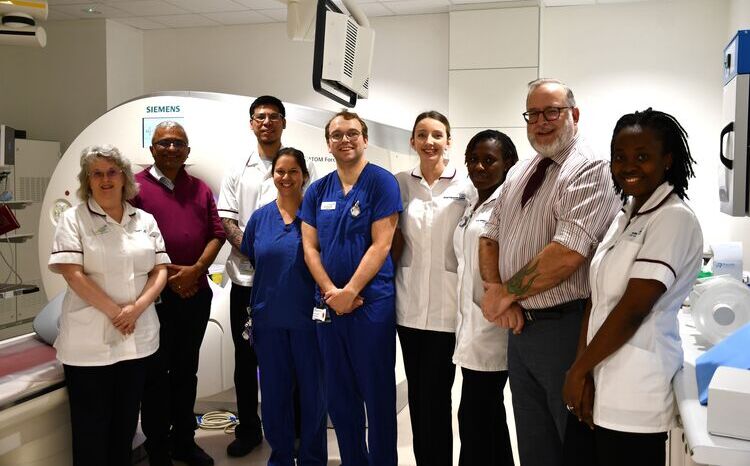Royal Papworth introduces AI software for stroke diagnosis
- 17 October 2024

- Clinicians at Royal Papworth Hospital NHS Foundation Trust are using AI technology to help stroke diagnosis
- The Brainomix e-Stroke system helps interpret CT scans and aid clinical decision-making
- It was introduced at the trust in July 2024
Clinicians at Royal Papworth Hospital NHS Foundation Trust are using AI technology from University of Oxford spin-out Brainomix, to deliver faster and more accurate diagnoses of strokes.
AI algorithms used by the Brainomix e-Stroke system, which was introduced at the trust in July 2024, help interpret CT scans, providing real-time information for hospital staff and assisting doctors in making informed decisions about patient care.
Dr Bobby Agrawal, consultant radiologist at Royal Papworth Hospital and clinical lead for the East of England Diagnostic Imaging Network, said: “Acute strokes are difficult to diagnose on CT scans.
“Our radiologists are heart and lung specialists, rather than expert radiologists, so they are not necessarily recognising all signs of a stroke.
“This is where the Brainomix systems helps, by analysing scans using AI algorithms to provide a faster and more accurate diagnosis.
“It then makes data instantly available to specialist stroke units, such as at Addenbrooke’s Hospital right here in Cambridge, speeding up the diagnosis of stroke and therefore allowing patients to receive treatment at the earliest opportunity.”
Ischaemic stroke is the most common type of stroke, caused by a blood clot cutting off blood flow to part of the brain. A mechanical thrombectomy is a minimally invasive procedure that involves the clot being pulled or sucked out using a special device, which restores blood flow.
This procedure is most effective the faster it can be carried out before a stroke, meaning a prompt identification and diagnosis is vital to ensure the best outcomes for patients.
Andrew Raynes, chief information officer at Royal Papworth Hospital, said: “It’s been a great team effort, and I feel proud of the planning which supported the safe launch of this AI technology.
“As a result of the successful introduction of Brainomix, we are helping to ensure the rapid assessment of the signs of stroke, providing our hospital teams with greater agility to respond to vital individual health needs in a timely way.”
The National Institute of Health and Care Excellence endorsed the Brainomix 360 AI-enabled software, in February 2024, acknowledging the impact it can have on clinical decision-making for stroke patients.
Dr Alain Vuylsteke, consultant intensivist and clinical director of surgery, transplantation and anaesthetics at Royal Papworth Hospital, said: “This is a great innovation demonstrating how AI can support the work of clinicians and speed up treatment to the appropriate patients.
“Our team of expert radiologists are all welcoming this new tool that should help more patients to avoid the devastating consequences of stroke.”
Meanwhile, Worcestershire Acute Hospitals NHS Trust announced in May 2024 that it has implemented AI software from RapidAI, which analyses brain images to help clinicians decide whether a patient requires an operation or medication to remove a blood clot.





